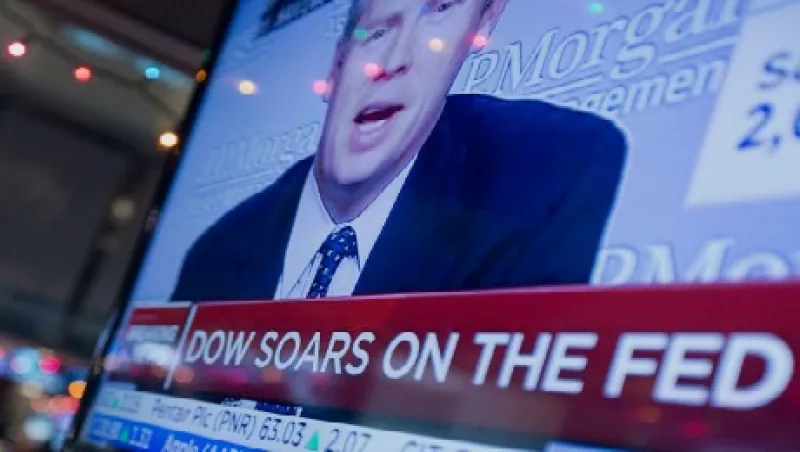The Federal Reserve takes the macroeconomic spotlight today with the release of notes from the Federal Open Markets Committee (FOMC)’s December 17 meeting. At that time, fixed-income markets had a muted reaction to the replacement of the term “considerable time” with “patience.” During the intervening weeks, U.S. Treasury yields have fallen significantly. In a complete reversal of the expected Fed tapering sell-off, yields on ten-year Treasuries dropped below 2 percent yesterday, the lowest level since May 2013. Based on the yield curve and strengthening U.S. dollar it appears that concerns about global growth and policy risk abroad will continue to support U.S. Treasury prices for the foreseeable future regardless of FOMC language.
Euro zone economies on divergent paths. Unemployment levels for December released in Germany today contracted for the third consecutive month, bringing the headline unemployment rate to 6.5 percent, a record low since German reunification. In contrast, Italy’s jobless rate for December rose to 13.4 percent, underscoring widening divergence between European Union states as growth remains elusive. Separately, aggregate December euro zone consumer price index levels were mixed, with the headline registering a year-over-year contraction but core levels marginally stronger than forecast.
U.S. trade and oil price data on deck. November trade data and weekly Energy Information Administration (EIA) crude stock levels are scheduled for release today. October data showed the petroleum trade gap rise above $15 billion with exports declining at a faster pace than imports on the back of falling crude oil prices. Consensus analyst forecasts for EIA crude supplies meanwhile are for an increase of 700,000 barrels, providing more pressure on near-term prices in futures markets.
Ireland issues bonds. Despite concerns reignited by the Greek election over peripheral EU economies, bond investors continue to support sovereign debt in expectation of a purchase facility announcement by the European Central Bank. Ireland is expected today to place €3 billion to €4 billion ($3.55 billion to $4.74 billion) worth of treasury securities maturing in seven years. The nation’s ten-year treasury yields touched a record low this week.
Seeding profits. Monsanto Co. reported fiscal first-quarter earning today, with results exceeding earlier guidance by the firm's management. Diluted earnings per share registered at $0.50 versus $0.69 in the same quarter last year as demand slackened in the wake of a historic bumper crop. Despite concerns about declining U.S. acreage under cultivation in response to lower grain prices, Monsanto expects a series of new seed products to help drive long-term growth and confirmed a fiscal-year 2015 ongoing earnings per share guidance of $5.75 to $6.00.
Portfolio Perspective: A Bad Start for Equities May not Mean 2015 is a Year for the Bears — Karl Haeling, Landesbank Baden-Württemberg
There is an old saying that the performance of the stock market in January sets the tone for equities for the remainder of the year. Given that the S&P 500 is already down more than 2 percent since December 31, investors are getting a bit nervous. While there may be a historical tendency for January’s performance to influence market action the rest of the year, it certainly is not always the case. Just a year ago, the S&P fell 1 percent in the first three trading days of 2014, moved sideways for a couple of weeks, then fell 6 percent during the last week of January and the first week of February. The market then turned bullish for most of the rest of the year.
So while the current risk-off trade probably has further to run, it does not necessarily mean that 2015 as a whole will be a year of the bear. While we certainly do not want to downplay the deflation pressures that are running through the international marketplace, there are a couple of upcoming developments that could soften the present risk-off panic.
One is the start of the next quarterly earnings reporting season. The last round of quarterly earnings was very influential in stabilizing the equity sell-off that occurred in late September through mid-October. Given that U.S. economic conditions have been relatively solid, it would be surprising for too many bearish surprises from either the numbers themselves or the executive guidance. A move toward quantitative easing by the ECB ten days later is already widely expected but should nonetheless comfort equity investors to some extent.
We have long felt that stock investors only panic out of fear of a major financial or economic meltdown. Simple rough patches are more easily absorbed. What has really driven fear now is the uncertainty of just how far oil prices will fall and how much debt-related troubles are created within the energy sector by such a rapid and dramatic plunge in prices.
As long as market catastrophe is averted, equity markets should stabilize and rebound at some point. At the same time, long-dated Treasuries should remain attractively priced in global yield terms, almost regardless of stock market performance.
Karl Haeling is a vice president of capital markets at Landesbank Baden-Württemberg’s New York office.






